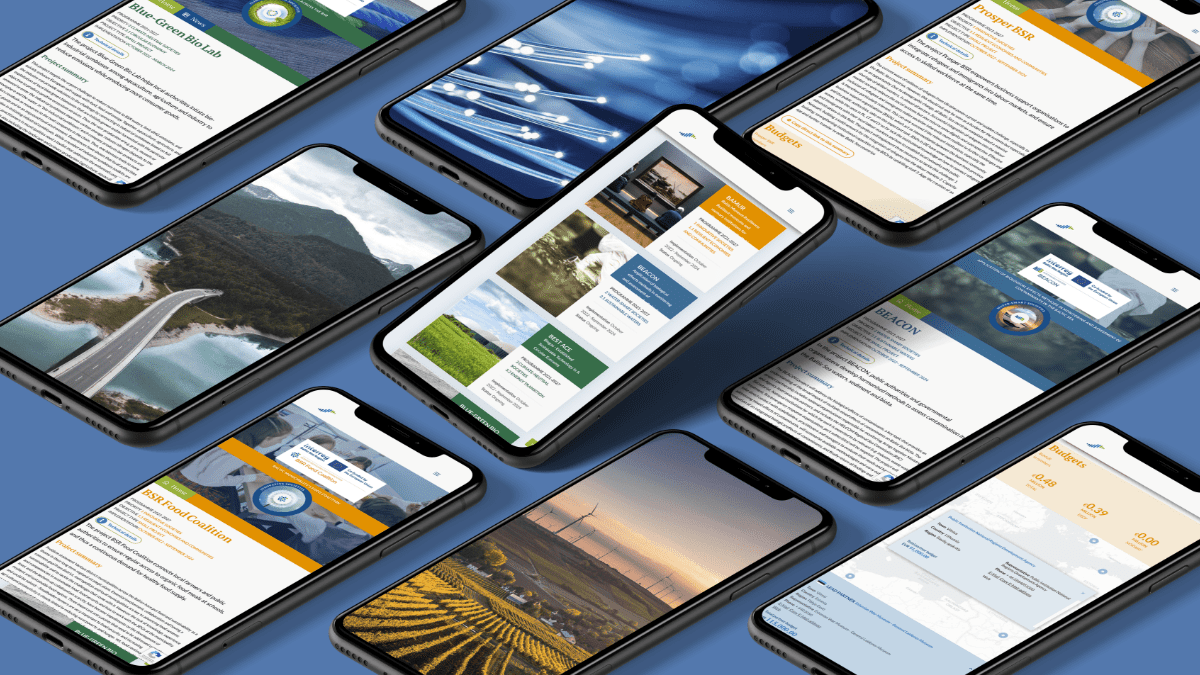
5 December 2022
Small steps for a big change: get to know our first small projects
Written by Viktoria Nilsson
17 first small projects in the Programme stand ready to work across borders and jointly address challenges in the region. Now, you can find these projects in the project library where all of them have their own page to present their activities and achievements. Small projects is a new instrument in the Programme to get easier access to Interreg cooperation and funding. Within a maximum duration of two years and a maximum budget of EUR 500,000, transnational partnerships in small projects experiment with new ways to tackle common challenges.
Nurturing water resources
The Baltic Sea is still calling for action: more needs to be done to prevent water pollution and clean waters from numerous contaminants. Not only the Baltic Sea and its aquatic environment but also the state of underground, coastal and inland waters raise concerns and require urgent response from the countries. To contribute to the sustainability of shared water resources, three small projects will focus on cleaning water from pollutants. Thus, the projects AdvIQwater and BEACON will take a closer look at wastewater by testing new methods such as solar-driven photocatalysis, fungal treatment and biofilms (AdvIQwater) and by assessing the biological effects of contaminants (BEACON). The project Lakes connect will focus on inland waters by mitigating the impact of extensive tourism on water quality in lakes.
In the blue economy, the Programme encourages the development of business ideas in marine spaces and the sustainable use of fresh and sea waters. The projects BaltSusBoating 2030 and BalMarGrav will explore the untapped potential of marine spaces: BaltSusBoating 2030 will bring together boating tourism networks to contribute to sustainable leisure boating, while BalMarGrav will make navigation for the offshore exploration industry safer.
Driving green transition
To secure climate-neutral societies, there is a need in driving energy transition and investing in a systemic shift of the economy from linear to circular. Among the selected small projects, the projects BEST ACE, BOWE2H and PV 4 All will lay foundations for intensified energy transition. BEST ACE will focus on biomethane to be used in long-haul transport and maritime industry, while BOWE2H will put joint offshore wind and hydrogen energy systems in the spotlight. The project PV 4 All will promote “green electricity” by encouraging citizens, organisations and companies to increase the use of photovoltaics for heating.
Four transnational partnerships of the projects Blue-Green Bio Lab, BREC, ChemClimCircle and ClassCircle are ready for taking action on the reorientation of the economy from linear to circular. Thus, Blue-Green Bio Lab will drive the development of industrial symbioses with full exploitation of biomasses in aquaculture, agriculture and industry. Another path in accelerating circularity is taken by the project BREC which will focus on agriculture, specifically by promoting the benefits of circular agriculture compared to conventional. ChemClimCircle will help municipal organisations to procure circular, climate-neutral and tox-free products and services, while GlassCircle will target manufacturers to make sure that glass fibre is recycled.
Strengthening resilience in uncertain times
In a time of the crises that the region is facing, more than ever we need a cohesive approach and increased capacity to quickly recover from shocks. In the Programme priority “innovative societies”, strengthening resilience and responsiveness are seen as preconditions for staying well-equipped for the uncertain future. As regards building resilient communities, four small projects, Prosper BSR, BaMuR, Urban Testbeds.JR and BSR Food Coalition will apply various approaches to addressing the needs of society. Thus, the project BaMuR will help museums, memory and cultural institutions to strengthen their consolation role to people. Urban Testbeds.JR will engage the young generation into co-creation and experimentation, while Prosper BSR will target refugees and immigrants to secure their successful integration into labour market. The project BSR Food Coalition will address resilience by putting sustainability and security of food in focus. Better responsive public services are developed in the project StratKit+ where partners will help public organisations to secure sustainable supplies of food.
Find the first news about the activities of the small projects in the project library. What a pleasure to see how ideas are turning into practice! We are excited to get more inspirational material to our project library while we are guiding new applicants for the 2nd call for small project applications.
More recent news
Grand results of the first round of small projects!
Despite the winter scenery, the results of 17 finalised Interreg Baltic Sea Region projects are in full bloom! And behind them lie two years of intensive work across borders, mutual learning and inspiration, and connections that last.
Climate-neutral future at hand for Baltic Sea region cities
Turning a city into a climate-neutral one requires knowledgeable people, thorough planning and solid financial resources. But how can cities manage this transition smoothly? The Interreg project Climate-4-Case guides cities around the Baltic Sea on how to do that right.
Designing Interreg Baltic Sea Region that belongs to everyone
10 December 2025 Designing Interreg Baltic Sea Region that belongs to everyone Written by Eeva Rantama What if the next Interreg Baltic Sea Region...
Monitoring the Programme’s progress: transnational cooperation in the making
Representatives from nine Programme area countries gathered in Berlin on 19-20 November 2025 to review the progress of the Programme’s implementation and start preparing for the post-2027 period.






